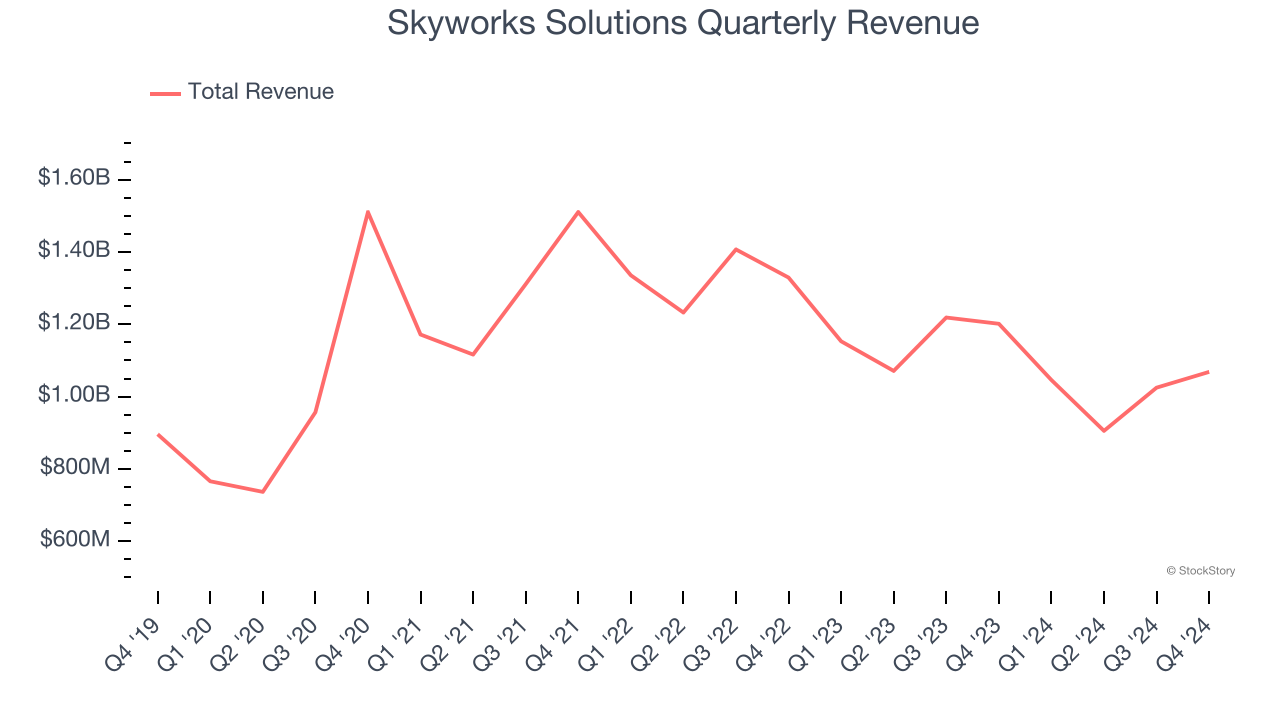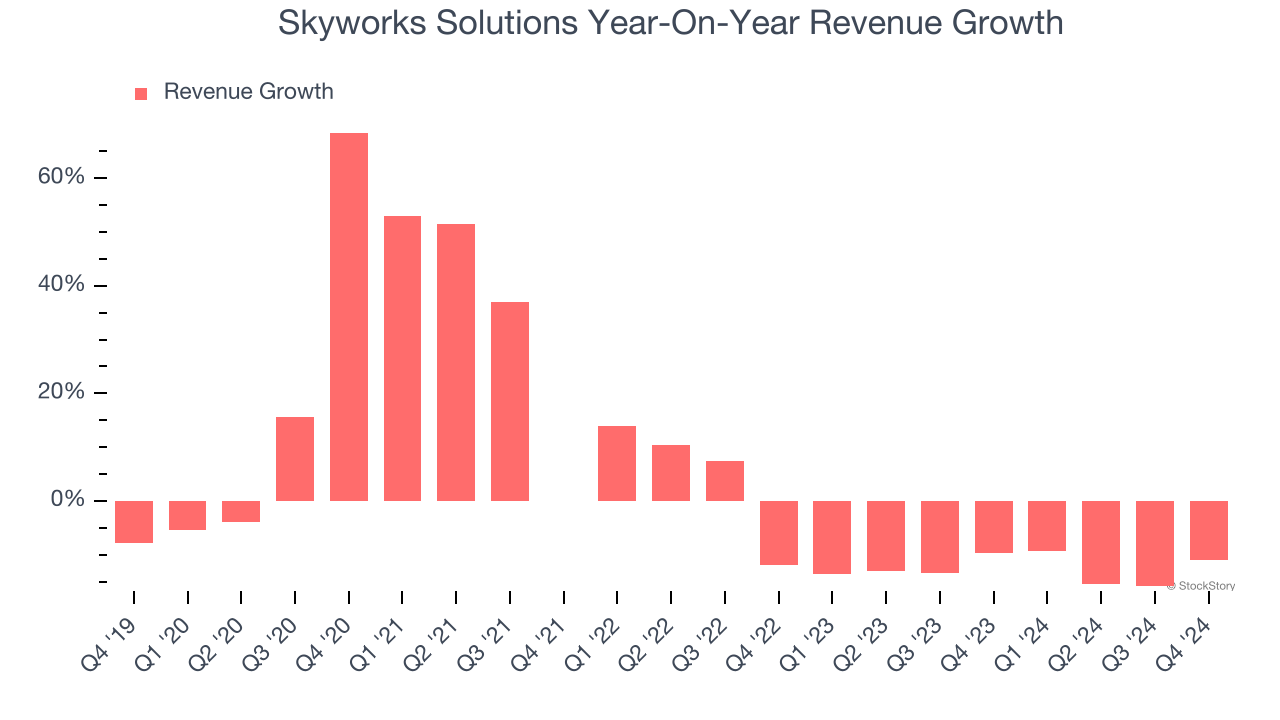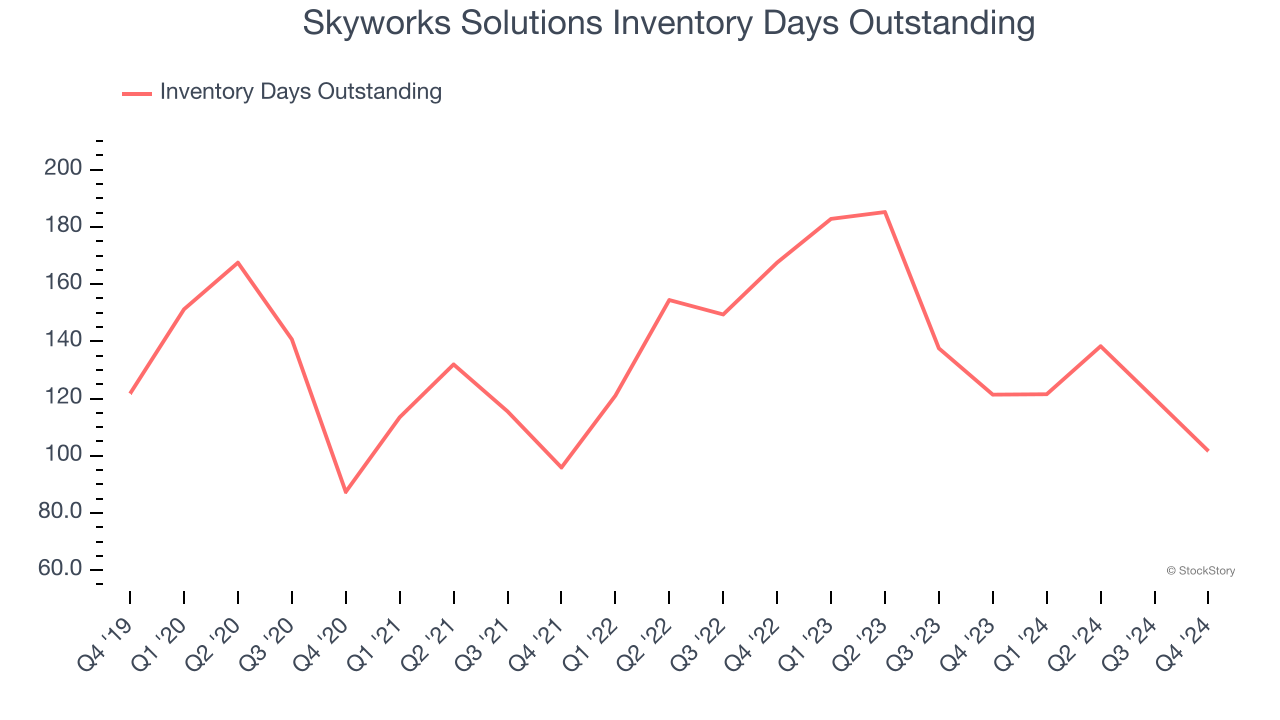
Wireless chips maker Skyworks Solutions (NASDAQ: SWKS) met Wall Street’s revenue expectations in Q4 CY2024, but sales fell by 11.1% year on year to $1.07 billion. The company expects next quarter’s revenue to be around $950 billion, coming in 100,716% above analysts’ estimates. Its non-GAAP profit of $1.60 per share was 1.7% above analysts’ consensus estimates.
Is now the time to buy Skyworks Solutions? Find out by accessing our full research report, it’s free.
Skyworks Solutions (SWKS) Q4 CY2024 Highlights:
- Revenue: $1.07 billion vs analyst estimates of $1.07 billion (11.1% year-on-year decline, in line)
- Adjusted EPS: $1.60 vs analyst estimates of $1.57 (1.7% beat)
- Adjusted Operating Income: $284.8 million vs analyst estimates of $283.4 million (26.7% margin, in line)
- Revenue Guidance for Q1 CY2025 is $950 billion at the midpoint, above analyst estimates of $942.3 million
- Adjusted EPS guidance for Q1 CY2025 is $1.20 at the midpoint, above analyst estimates of $1.19
- Operating Margin: 16.9%, down from 21.5% in the same quarter last year
- Free Cash Flow Margin: 31.7%, down from 62.6% in the same quarter last year
- Inventory Days Outstanding: 102, down from 120 in the previous quarter
- Market Capitalization: $13.81 billion
“Skyworks started the new fiscal year with solid results, growing revenue 4% sequentially and surpassing the midpoint of our guidance,” said Liam K. Griffin, chief executive officer and president of Skyworks.
Company Overview
Result of a merger of Alpha Industries and the wireless communications division of Conexant, Skyworks Solutions (NASDAQ: SWKS) is a designer and manufacturer of chips used in smartphones, autos, and industrial applications to amplify, filter, and process wireless signals.
Analog Semiconductors
Demand for analog chips is generally linked to the overall level of economic growth, as analog chips serve as the building blocks of most electronic goods and equipment. Unlike digital chip designers, analog chip makers tend to produce the majority of their own chips, as analog chip production does not require expensive leading edge nodes. Less dependent on major secular growth drivers, analog product cycles are much longer, often 5-7 years.
Sales Growth
Examining a company’s long-term performance can provide clues about its quality. Any business can put up a good quarter or two, but the best consistently grow over the long haul. Unfortunately, Skyworks Solutions’s 4.1% annualized revenue growth over the last five years was sluggish. This fell short of our benchmark for the semiconductor sector and is a tough starting point for our analysis. Semiconductors are a cyclical industry, and long-term investors should be prepared for periods of high growth followed by periods of revenue contractions.

Long-term growth is the most important, but short-term results matter for semiconductors because the rapid pace of technological innovation (Moore's Law) could make yesterday's hit product obsolete today. Skyworks Solutions’s history shows it grew in the past but relinquished its gains over the last two years, as its revenue fell by 12.7% annually. 
This quarter, Skyworks Solutions reported a rather uninspiring 11.1% year-on-year revenue decline to $1.07 billion of revenue, in line with Wall Street’s estimates. Company management is currently guiding for a 90,722% year-on-year increase in sales next quarter.
Looking further ahead, sell-side analysts expect revenue to remain flat over the next 12 months. Although this projection implies its newer products and services will catalyze better top-line performance, it is still below average for the sector.
Software is eating the world and there is virtually no industry left that has been untouched by it. That drives increasing demand for tools helping software developers do their jobs, whether it be monitoring critical cloud infrastructure, integrating audio and video functionality, or ensuring smooth content streaming. Click here to access a free report on our 3 favorite stocks to play this generational megatrend.
Product Demand & Outstanding Inventory
Days Inventory Outstanding (DIO) is an important metric for chipmakers, as it reflects a business’ capital intensity and the cyclical nature of semiconductor supply and demand. In a tight supply environment, inventories tend to be stable, allowing chipmakers to exert pricing power. Steadily increasing DIO can be a warning sign that demand is weak, and if inventories continue to rise, the company may have to downsize production.
This quarter, Skyworks Solutions’s DIO came in at 102, which is 34 days below its five-year average. At the moment, these numbers show no indication of an excessive inventory buildup.

Key Takeaways from Skyworks Solutions’s Q4 Results
Despite in line revenue, we liked seeing Skyworks Solutions’s strong improvement in inventory levels. We were also glad its revenue guidance for next quarter came in much higher than Wall Street’s estimates. Overall, we think this was still a solid quarter with some key areas of upside. The stock remained flat at $87.50 immediately after reporting.
Sure, Skyworks Solutions had a solid quarter, but if we look at the bigger picture, is this stock a buy? We think that the latest quarter is only one piece of the longer-term business quality puzzle. Quality, when combined with valuation, can help determine if the stock is a buy. We cover that in our actionable full research report which you can read here, it’s free.




